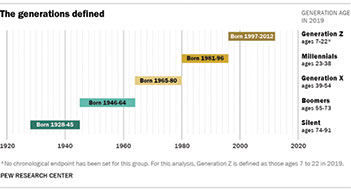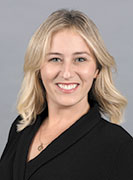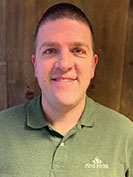 |
|||


|
 |


|
|

Up-and-coming leaders share unique perspectives on industry
Editor’s note: Welcome to “Mind of a Millennial,” CMN’s new segment tapping into the unique perspectives of dairy industry professionals born between 1981 and 1996. As this segment of the population begins to take on increasing leadership roles at companies across the industry, we delve into the challenges millennials face in today’s fast-paced workforce, from communication, to management style, to work/life balance.
MADISON, Wis. — What comes to mind when you hear “millennial?”
 |
According to a recent Pew Research Center analysis of U.S. Census Bureau data, more than one in three American labor force participants (35%) are millennials, making them the largest generation in the U.S. labor force. Born after baby boomers and Generation X and before Generation Z, millennials are uniquely positioned as a bridge between generations.
In our new series exploring millennials’ role in the workplace, our first round of participants tackles questions related to working with different generations, traditional versus home offices, management styles, how they get their news and the term “millennial” itself.
This round’s participants are:
• Alyssa Badger, director of global operations, HighGround Dairy, Chicago
• Ian Behm, general manager, Pine River Pre-Pack, Newton, Wisconsin
• Nick Ivarson, customer
service representative, Ivarson Inc., Milwaukee
• Quenton Lind, vice president of sales and marketing, Separators Inc., Indianapolis
• Andy Pfister, vice president of procurement/industrial sales, Masters Gallery Foods, Plymouth, Wisconsin
1. Millennials in the workplace are uniquely positioned to work between different generations — baby boomers, who are retiring, Gen X and Gen Z. How do you navigate between these different generations and their preferred methods of communication and doing business, both with employees and customers? How are millennials positioned to “bridge the gap?”
 |
Alyssa Badger |
Badger: Each generation has a unique way of adding value to the business world; baby boomers are consistently focused on relationships, Gen X and Y seem to center their attention on being direct and concise, while millennials tend to live a fast-paced life and are always searching for ways to move up the ladder as quickly as possible. Respect is the most important aspect of bridging the gap, followed by strong communication. There have been times when I had to “force” unwanted meetings, but checking in with one another is key to your company’s success. When it comes to customers, I honestly believe that as long as you are putting them first and consistently making sure your actions are an attempt to better serve them, that it does not matter when they were born. The strongest offering that millennials have as we enter a new decade is our strong disposition to want to share our ideas, but we also have to make an effort to listen to our predecessors.
Behm: We have a large generational gap within our company and there definitely are preferred methods of communication by each, however I find that direct verbal communication works the best for everyone. However, it is apparent that the younger generation would much rather communicate via email/text and the older generations would rather discuss over the phone. As an “older” millennial I was a young adult prior to the smart phone boom and can appreciate today’s technology, yet understand the importance of “old school” communication styles.
Ivarson: For anyone, it is important to know your audience, understand how business has historically been done and where the trends are pointing. In the same vein as generations behaving differently, workplace culture can be so vastly different from one place to the next, so being adaptable and available by any means of communication is an absolute need. Learning the best way to get in touch with the people you need will make your day much more productive. The way we “bridge the gap” is by realizing the value in some of the more traditional ways of business and finding a balance between that and the newer ideas that come into play.
Lind: Navigating the different generation communications is too easily pigeonholed. People are people, we can’t lose sight of that. Some of the best texters I’ve met would fit in the baby boomer category. With that said, I’ve found it best to ask each individual. I interact with numerous plant personnel where it isn’t possible to have phone conversations or to Skype at the drop of a hat. Texting really can be best. I also work with corporate employees or owners who prefer face-to-face communication. Millennials “bridge the gap” because we have adapted to each preferred method of communication from our grandparents to our nieces and nephews.
 |
Andy Pfister |
Pfister: Being on the older end of the millennial spectrum, I often find myself more closely relating to the childhood experiences of my Gen X friends, but also feel that I can effectively relate and communicate with pretty much any age group. My wife has always referred to our specific age group as the “Oregon Trail Generation,” which I find humorously appropriate. I grew up in a small Illinois farming community, where kids played outside (for the most part) until the streetlights came on, in a home where we had the “5 coolest TV stations.” However, at the same time, I was lucky to be exposed to technology from an early age in grade school — where we often played “Oregon Trail” on the Apple IIs in the school computer lab — and then saw technology advance to the start of social media and the iPhone in college. I’m thankful for this unique combination of life experiences, as it does help me to bridge the gap and find shared perspective with a wide range of people in the workforce. Regardless of age, each person has their own communication style, and adapting to each individual is a very necessary skill in today’s competitive marketplace.
2. If given the opportunity to choose, would you rather work at home, in a traditional office or in an office with an open floor plan? Why? How important do you feel it is for team members to meet face to face?
Badger: This ultimately depends on your role within your company, but often times I find that I am increasingly productive when I work from home. It is quieter, the coffee is stronger, and distractions are minimal. As someone who writes for a majority of the day, working from home has a great advantage; however, it becomes a necessity to meet with your team in person to maintain camaraderie. The closer you are with your team, the more ambitious your drive to succeed for the greater good can become.
 |
Ian Behm |
Behm: I would much rather work in an office with an open floor plan. As the general manager I interact with everyone within the company every day. I am involved in all aspects of the business, so it is important for me to hear different conversations between employees and also be able to deliver a message to multiple employees in a single conversation. Face-to-face communication is not only important, it is critical in most situations. It can quickly remedy a conflict rather than multiple back-and-forth messages/emails. In addition, written communication can often lead to a misinterpretation of the tone and intentions of a message.
Ivarson: On this one I may not fit the trend, but I prefer a traditional office all the way. With how quickly some things move, working from home is not always ideal. It can feel like a trading floor in an open area when a lot of conversations are going on, whether in person or over the phone; it is not a great setting if you’re doing work that takes a lot of focus. Face-to-face meetings are extremely valuable as they are how relationships are built, and they are the best way to convey the nature of a situation. It’s important to realize when you need to take the time to see someone, or if a short email, text or call would suffice.
Lind: It’s dependent on the organization. We have sales and service staff that work remote, so working from home is “normal” for us. However, we take advantage of technology and meeting face to face is one click away. No matter the amount of technology, meeting face to face helps you pick up the nuances that aren’t present in other methods of communication. It’s still the most important form of communication in my humble opinion.
Pfister: My preference is to work in a traditional office. I believe open floor plans are effective for certain businesses, like commodity trading offices, etc. However, studies continue to show that they are not a good solution for many (dare I say, most) businesses. I often work from home later in the evening, but seldom during normal business hours. Face-to-face interaction is very important with team members as well as customers and vendors. Today’s 24/7 world is both a blessing and a curse. While email and texting can be very efficient, it’s important not to fall into relying solely on that method of communication. Personal relationships are best fostered through taking the time to actually see and speak to people directly.
3. Many millennials, especially older ones, tend to want to distance themselves from the term “millennial.” Why is that the case? What negative connotations does the word “millennial” conjure?
Badger: I am an older one and honestly have found it easier to work with the other generations than my own. The drive to succeed for the greater good, that I mention above, seems to have been lost by a lot of millennials; this may have been driven by the fact that many of us faced our first job hunting experience during the financial crisis, which instilled a thought process of needing to get ahead of everyone else as quickly as possible, instead of having the ability to be able to think in terms of creating an alliance with your peers.
Behm: I understand this, as I honestly didn’t realize I was a “millennial” until recently. I suppose older millennials (myself included) refer to millennials as the generation who didn’t live in a world without the internet. I think the term itself is interpreted as negative because the generation doesn’t understand how “easy” they have it with today’s technology. They are also viewed as “anti-social” and can’t live without their phones.
 |
Nick Ivarson |
Ivarson: Millennial is one word for an incredible amount of people. I would never put it down as a descriptor of myself, because it does not really say anything about who I am, and it does have some baggage with it just like “boomer.” From my experience, when generational terms get brought up they are more often used negatively than positively, to place blame or put down. I try to avoid them in conversation.
Lind: Millennials don’t like labels. Heck, we can’t stand them and yet we are the most stereotyped generation to date. Grouping us, or anyone of any age, in a negative manner isn’t exactly the warmest and most inviting way to start a conversation. Don’t believe me, Google “Millennials are” and the first two auto fills are “poor” and “killing the __.” Awesome. Thanks, Google.
Pfister: I think the reality is that every generation tends to initially cast a negative light on the ones that follow. As my peers and I started our professional careers, the term “millennial” was kind of used as a playful, yet thinly veiled, insult. I definitely tried to distance myself from the term at first, but less so as time has gone on. Part of that was just avoiding any association to negative connotations of laziness, arrogance, self-entitlement, etc. I’ve never wanted to be defined by my age or let a generational perception impact my own personal reputation. Rather, let me stand on my own two feet, challenge me in any way you like, and judge me on the results I can deliver. While every generation has weaknesses and some poor performers, I believe most millennials are tech-savvy, innovative problem solvers, who are looking to make a positive impact on their companies and communities. I guess I’ll own it right now…yes, I’m a millennial!
4. What kind of relationship do you like to have with your direct supervisors? What type of leadership style do you respond best to?
Badger: In typical millennial fashion, it is important for me to feel valued but also to have open communication with my supervisor that eventually leads to an increase in confidence from them that I will get the job done the way they need it to be completed.
Behm: Our relationship has evolved over the past decade, but is currently in a mentor/mentee relationship. I lean on leadership when I have large projects or need to know the history of a company or product. I respond best to open and immediate communication and a leadership style that includes humility and respect. I do not believe the millennial generation responds well to the “old school” directive leadership, which usually does not include the “why” or the “how”.
Ivarson: I am thankful to have not had too much “type A” supervision in most of my professional experience. I work best when I am given a task or project and able to run with it, getting guidance when needed and a correction if moving off course. Part of that is the culture here at Ivarson of the trust we have in each other. As a family business we can empower each other to try different things and make use of our unique skills, sometimes finding new ways of doing things even if they are not “how it was always done.”
 |
Quenton Lind |
Lind: Direct. But I believe this has more to do with individuals and less to do with age group generations. I grew up on a hobby farm, I was a college athlete, and both my parents worked. If something needs to get done, just ask. Don’t hem-an-haw around it. Let’s get to work. Again, I think that has more to do with my background than it does with my age group.
Pfister: I’ve typically had a very open and positive relationship with my direct supervisors throughout my career, and I really appreciate those great mentors from whom I’ve been able to learn so much. It’s always exciting to be able to share ideas and collaborate to find new, creative ways to add value to the business. I believe highly skilled leaders actually incorporate multiple styles, but the best ones in the business world start with the foundation of servant leadership. They lead by example, develop their people, and genuinely care about doing the right thing.
5. Where do you get your news, both initially and in any follow up you do? What do you read or listen to every day to keep current on the world around you?
Badger: We now live in a 24/7 news world, so I think it is important to know when to take a break from the constant flow of information. Having the TV on as a form of getting your daily dose of news has become far too negative and overwhelming, which has pushed me toward a slower approach of absorbing data and statistics, subscribing to online newspapers as well as the black and white print delivered at my doorstep. When I am in a hurry, however, I am still more inclined to open up a podcast app than turn on the TV.
Behm: I get the majority of my news from radio and local/national TV news. I also get daily dairy industry emails and I read all of the cheese industry print newspapers to stay current with what’s happening in our industry. Of course, like many other millennials I see a lot of news on Facebook and other social media outlets.
Ivarson: A lot of information comes by email initially. Daily or weekly blasts from a few sources that I find interesting or relevant in my work or life — local and industry organizations. If I see something I’d like to know more about I can read the full article online and see where that takes me.
Lind: The internet is where I go to get news. I am a bit old fashioned as I still enjoy talk radio and a newspaper and coffee in the morning. I hardly watch TV but if my wife has it on, I will watch. If I want to dig deeper into something Google is my best friend. If I like what I am digging deeper into I will search podcasts on the topic. Come to think of it, there really are way too many ways to get info these days. Oh, to be a millennial…
Pfister: You mean aside from Cheese Market News, right? Well, I have a few daily email subscriptions that send me morning updates on the top headlines and current events — both macro and dairy industry specific. Aside from that, I have a handful of news apps on my phone. I do open the Wall Street Journal app at some point each day and get alerts from several others on major headlines. Any necessary follow-ups are typically pursued through my good friend, Google.
CMN
Are you a dairy industry professional born between 1981-1996? Join in an upcoming round of Mind of a Millennial! Contact CMN Editor in Chief Alyssa Mitchell at amitchell@cheesemarketnews.com for more details.
| CMN article search |
|
|
© 2025 Cheese Market News • Quarne Publishing, LLC • Legal Information • Online Privacy Policy • Terms and Conditions
Cheese Market News • Business/Advertising Office: P.O. Box 628254 • Middleton, WI 53562 • 608/831-6002
Cheese Market News • Editorial Office: 5315 Wall Street, Suite 100 • Madison, WI 53718 • 608/288-9090